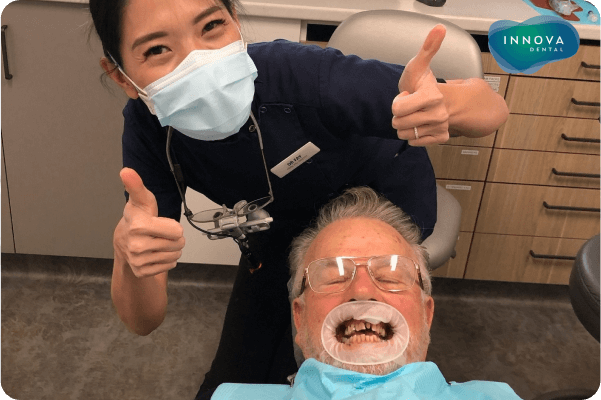Anxiety Dentistry
Discover gentle, anxiety-free dentistry at Innova Dental - where your comfort and oral health are our top priorities.

Dental Anxiety: Breaking Down the Barriers
Dental anxiety refers to apprehension related to dental visits, while dental fear and phobia are more intense and may lead to avoidance of dental treatment. These emotions can stem from high dental fear, like previous trauma, feeling self conscious, fear of needles, or fear of the dentist.
Managing dental fear and anxiety is essential for ensuring patients receive dental care for all their dental procedures. Our dental team is experienced in working with phobic patients. From creating a calming dental environment to offering relaxation techniques, we strive to alleviate anxiety and promote a positive dental experience.
In addition to sedation methods, we also focus on empowering patients by managing dental anxiety. Techniques such as deep breathing exercises, muscle relaxation, and cognitive behavioural therapy can help patients develop coping skills to better manage their anxiety disorders. We aim to create a supportive and understanding dental environment where patients feel confident and at ease.
Delving into the Causes of Dental Phobia
Understanding the root causes of dental anxiety is crucial for effectively addressing and managing this common condition. Here, we delve into the primary causes of dental anxiety to shed light on this prevalent issue.

Traumatic Experiences
Negative experiences during previous dental visits, such as pain, discomfort, or perceived mistreatment, can significantly contribute to the development of dental anxiety.
-1.png?width=171&height=170&name=Frame%2044648%20(1)-1.png)
Fear of Pain
Patients may anticipate or recall past painful experiences, leading to anxiety and apprehension about future dental treatments.
-1.png?width=171&height=170&name=Frame%2044648%20(2)-1.png)
Loss of Control
Being in the dental chair and relying on the dentist to perform treatments can evoke feelings of helplessness and anxiety.
-2.png?width=171&height=170&name=Frame%2044648%20(3)-2.png)
Fear of the Unknown
Patients may feel anxious about unfamiliar procedures, dental instruments, or the potential complications associated with treatment.
-1.png?width=171&height=170&name=Frame%2044648%20(4)-1.png)
Sensory Triggers
Sensory stimuli such as the sights, sounds, and smells associated with dental clinics can trigger anxiety. The clinical environment and dental instruments may evoke feelings of unease or discomfort.
-1.png?width=171&height=170&name=Frame%2044648%20(5)-1.png)
Psychological Factors
Underlying psychological factors such as anxiety disorders, phobias, or trauma outside of the dental setting can predispose individuals to dental anxiety. These psychological issues may exacerbate fear and anxiety related to dental visits.
-1.png?width=171&height=170&name=Frame%2044648%20(6)-1.png)
Dental Trauma
In cases of dental trauma, where a tooth has been chipped, broken, or knocked out, Same Day Crowns offer a fast and effective solution for restoring the tooth's function and appearance.
-1.png?width=171&height=170&name=Layer_1%20(3)-1.png)
Small Gaps Between Teeth
Same Day Crowns can close small gaps between teeth, improving overall dental aesthetics and enhancing the symmetry of the smile.
Dental Phobia and Its Consequences on Oral Health

- Dental anxiety can make patients delay seeking dental treatment due to apprehension.
- This delay can lead to the progression of dental issues such as cavities, gum disease, and infections, ultimately compromising oral health.
- Dental anxiety may contribute to poor oral hygiene habits, such as irregular brushing and flossing or avoiding necessary dental care routines.
- Inadequate oral hygiene increases the risk of tooth decay, gum disease, and other oral health problems.
- Patients with dental anxiety may experience heightened stress during dental visits, which can exacerbate existing dental conditions or contribute to the development of new ones.
- The increased risk of dental disease underscores the importance of addressing dental anxiety to maintain optimal oral health.
- Regular dental check-ups and cleanings are essential for preventing dental issues and maintaining oral health.
- Individuals with dental anxiety may avoid routine dental appointments, leading to a lack of preventive care and increased susceptibility to oral health problems.
- It gets challenging for patients to tolerate necessary dental procedures, resulting in incomplete treatments or compromised outcomes.
- Effective management of dental anxiety is crucial for ensuring successful treatment outcomes and preserving oral health.
Finding Comfort in Dental Treatment

At Innova Dental, we understand that dental anxiety and fear are common concerns for many patients, which is why we prioritise providing a comfortable and supportive environment for all individuals. We recognise that each patient is unique, and we take the time to listen to their concerns, address any anxieties they may have, and tailor our approach to suit their individual needs.
Our dental practice offers a range of anxiety-reducing strategies, such as deep breathing and muscle relaxation, as well as cognitive behavioural therapy and conscious sedation. Our dental team is trained to provide gentle and supportive care, even the most anxious patients feel safe and comfortable in the dental chair.
The Faces of Dental Anxiety: Who's Impacted?
At Innova Dental, our team is dedicated to providing care tailored to the needs of each patient. We offer a range of anxiety-reducing techniques and sedation options to help ensure a comfortable and stress-free dental experience for all.

Children & Adolescents
Dental anxiety often begins in childhood and can persist into adulthood if not addressed early on. Children may feel scared or anxious about unfamiliar experiences, such as dental procedures, which can lead to avoidance of dental visits and subsequent oral health issues.

Medical Conditions
Certain medical conditions, such as post-traumatic stress disorder (PTSD) or mood disorders, can exacerbate dental anxiety. Patients with these conditions may require special considerations and gentle, empathetic care to help manage their anxiety during dental treatment.
.png?width=50&height=51&name=elderly%20(1).png)
Age
As individuals age, they may become more susceptible to dental anxiety due to concerns about discomfort, mobility issues, or cognitive decline. Additionally, elderly patients may have complex dental needs, which can contribute to feelings of anxiety about undergoing dental procedures.
Identifying Symptoms of Dental Fear
Recognizing the signs and symptoms of dental anxiety is crucial for both patients and dental professionals to provide appropriate support and care. By addressing these concerns proactively, dental professionals at Innova Dental strive to create a supportive environment that promotes relaxation and comfort for all patients.
-
Avoidance Behavior:
Patients may exhibit avoidance behaviour towards dental appointments or procedures. They may procrastinate scheduling appointments or cancel them altogether due to fear. -
Physical Symptoms:
Dental anxiety can manifest in various physical symptoms such as increased heart rate, sweating, trembling, and shallow breathing. These physiological responses are indicative of the body's stress response to perceived threats. -
Emotional Distress:
Feelings of fear, nervousness, and panic are common emotional responses. Patients may express these emotions verbally or through body language during dental visits.
-
Difficulty Relaxing:
People may find it challenging to relax in the dental chair, or on edge throughout the appointment. Their inability to unwind can exacerbate their anxiety further. -
Sensitivity to Dental Stimuli:
Patients with dental anxiety may exhibit sensitivity to dental stimuli such as the sound of drilling, the sensation of dental instruments, or even the smell of dental materials. -
Catastrophic Thinking:
Dental anxiety involves negative thoughts and catastrophic thinking related to dental procedures. Patients may imagine worst-case scenarios or catastrophize the potential outcomes of dental treatment, further fueling their anxiety.
How to Manage Dental Anxiety or Phobia
Open Communication
Our team prioritises open communication with our patients. We encourage you to share your concerns and fears with us. By understanding your specific anxieties, we can work together to create a comfortable and supportive environment.
Cognitive-Behavioural Therapy (CBT)
CBT is a highly effective psychological treatment for anxiety disorders, including dental phobia. Through CBT, the aim is to change the way you think and feel about dental treatment, leading to a more positive experience.
Sedation Options
For patients with anxiety or phobia, we offer conscious sedation options such as nitrous oxide (laughing gas) or intravenous (IV) sedation. These medications can induce a state of relaxation and reduce awareness during dental procedures.
Gradual Exposure
Facing your fears can be challenging. By starting with simple procedures and gradually progressing to more complex treatments, we can help you build confidence and trust in the dental environment over time.
Final Adjustments
Any necessary adjustments to ensure your comfort and satisfaction with your new crown, ensuring optimal function and aesthetics.
Follow-Up
Our team provides post-treatment care instructions and schedules follow-up appointments as needed to ensure the longevity and success of your Same Day Crown.
Cost and Insurance
Curious about the investment in your new smile? We provide transparent information on the cost of Invisalign treatment and offer financing options to make achieving your dream smile a reality.
Take it from our patients

Samina Alam

Lacie Hall
Absolutely amazing, Lauren the receptionist was so lovely and Dr Olan (I think that was her name) done such a great job with me, so gentle, polite and comforting.

Linda Cundall
Great work
Made me feel as comfortable as he could as I get very nervous.
Next day it feels great isn’t as sore as I was expecting.

Tracey Wheatley
Amazing service, would definitely recommend this dental surgery. Made me feel super comfortable and relaxed. I’m actually looking forward to my next appointment!

James_T _Ripper
My experience with Dr. Jess was great. I found her not only to be incredibly professional but also kind and helpful with even the dumbest if questions from me.
I cannot recommend this place enough.

Di Robbie
Excellent communication and front desk service. Dr Ha was very thorough and approachable.

Joel Baker
Highly recommended, I’ll definitely be staying with Innova Dental. Great people

Gregory Potters
Dr. Xuan Xi is a great communicator, a gentle practitioner, and his work is always perfection.

Jason Barber
Top class facilities and friendly staff from reception to the dentists and assistants. State of the art equipment. Very comfortable experience! Super nice people :)

Steph Brake
Great service, very friendly. Explained everything really well and went above and beyond with their quality care

Jen Evans
Dr Olan and her team provide professional and friendly service. I’m delighted by the dental work I received and can highly recommend.

Helen Morice
Excellent service provided and would highly recommend Innova Dental Launceston

Elizabeth Skirving
You feel cared for by the team at Innova Dental, Dr Ha is very professional, efficient and has a lovely approach when looking after my teeth.
Frequently Asked Questions
Explore common queries about our Anxiety Dentistry
Dental anxiety is a prevalent issue, with research suggesting that a significant percentage of the population experiences some level of fear or anxiety related to dental visits or treatments. Understanding and addressing dental anxiety is essential for ensuring optimal oral health outcomes.
To reduce dental anxiety before a dental appointment, it's essential to communicate openly with your dentist about your fears and concerns. They can provide reassurance, explain procedures in detail, and offer relaxation techniques or sedation options to help you feel more at ease.
Dental anxiety can affect people of all ages and backgrounds, but it may be more prevalent in individuals who have had traumatic dental experiences in the past, those with underlying anxiety disorders, or those with specific phobias related to dental procedures.
Yes, dental professionals are trained to help patients with dental anxiety feel more comfortable and relaxed during appointments. They can create a supportive environment, explain procedures thoroughly, and offer sedation options to alleviate anxiety.
.png?width=67&height=59&name=Group%20(21).png)
Need help?

Business Hours
Mon – Thu 8:30 AM – 8:00 PM
Fri 8:30 AM – 5:00 PM
Sat 8:30 AM – 1:00 PM
Our Address
97 Bathurst Street,
Launceston TAS 7250
Book an Appointment
Feel free to contact us anytime. We will get back to you as soon as we can.




